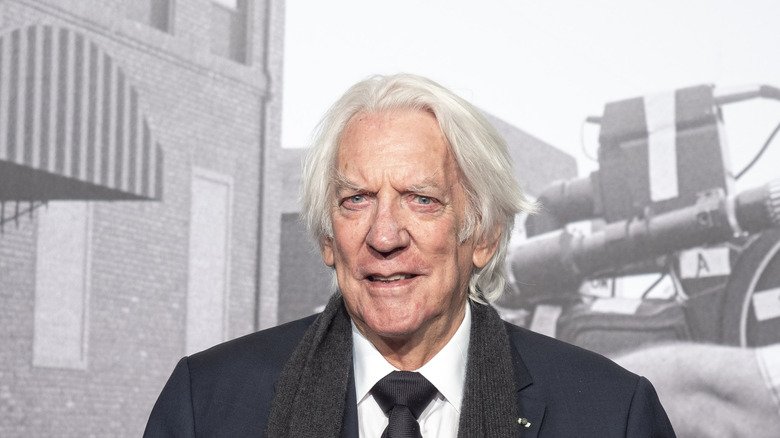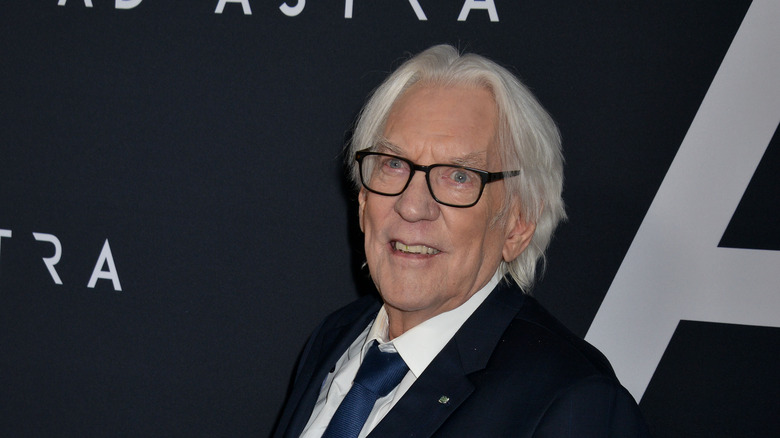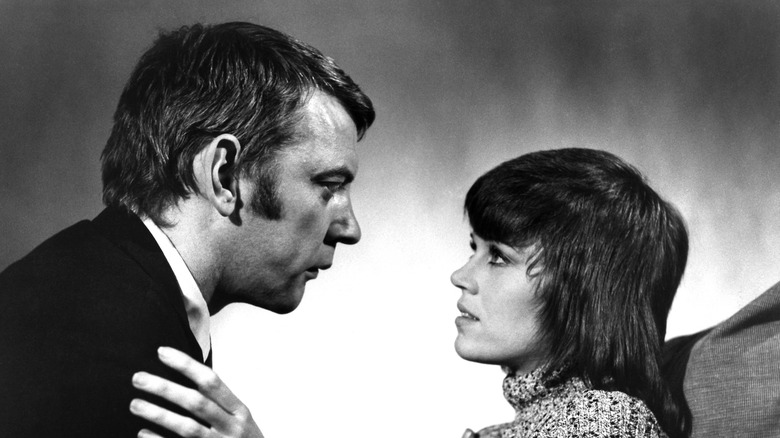The Tragedy Of Donald Sutherland Explained
Donald Sutherland died on June 20, 2024, at age 88 after what was only reported as a "long illness." The renowned Canadian actor appeared in a variety of roles throughout his long life and decided he wanted to be an actor at just 16 years old. He told his father his plans while the pair were on a drive in his home province of Nova Scotia. "I have no idea why I thought to become an actor," he remarked. "Neither of us had ever been to the theatre before."
But his childhood, as with the rest of his life, had its fair share of tragedies. From childhood illness to a near-death experience in his mid-30s, the actor has had plenty of hurdles throughout his long career into the echelons of revered Hollywood performers. His last performance, he'd hoped, would be in death. "I'm really hoping that in some movie I'm doing, I die but I die, me, Donald, and they're able to use my funeral and the coffin," he told the Associated Press in 2017. "That would be absolutely ideal. I would love that."
His childhood was marred by illness
Donald Sutherland experienced hardship early in life. In 1937, at just 2 years old, he contracted polio (or infantile paralysis), which did not yet have a vaccine. "The first word I said was neck," he told Esquire. "My mother turned around and said, "What did he say?" My sister said, "He said, 'Neck.' " My neck was killing me. That was a sign of polio. One leg's a little shorter, but I survived." A couple years later he had mastoiditis, a bacterial infection of the large bone behind the ear. A hammer and chisel were used to clear it up. In the 4th grade he experienced rheumatic fever, which kept him home for the entire school year. The Heart & Stroke Foundation says about 60% of people with rheumatic fever develop rheumatic heart disease — the leading cause of death among children aged 5 to 15, per Frontiers in Cardiovascular Medicine.
As scary as these experiences were, Sutherland was still able to look at the positive. Notably, he told the Los Angeles Times in 1989 at age 54 that these early-life brushes with mortality instilled in him an appreciation for those in the medical field. And they wouldn't be the last.
He had a near-death experience
Donald Sutherland's health troubles continued into his later life. In 1970, when he was in his mid-30s, he had a near-death experience after being infected with spinal meningitis, which affects the fluid and membranes around the spinal cord and brain. The close call came while he was filming "Kelly's Heroes." "I came to Yugoslavia for a day's filming and I was out for six weeks," he said, per The Irish Examiner. "They took me to hospital — I had spinal meningitis. They didn't have the antibiotics, so I went into a coma, and they tell me that for a few seconds, I died."
Psychiatrist Raymond Moody coined the term""near-death experience" in 1975, and people who experience them often speak of dead relatives, bright lights, and even alien beings. Sutherland, it seems, saw at least one of these. "I saw the blue tunnel, and I started going down it," he said. "I saw the white light. I dug my feet in." He wasn't ready for death just yet, though. "I didn't want to go – but it was incredibly tempting," he recalled. "You just go, 'Aw, s*** man, why not?'"
Sutherland still experienced stage fright in his later years
Donald Sutherland's acting career spanned over seven decades, but that doesn't mean he overcame his performance anxiety. Speaking to Backstage, he recalled teaching a master class at Idyllwild's theatre school and feeling the creep of anxiety as he stared at the crowd. "When I stood up and looked at all these 18-year-olds, I held out my hand, and it was shaking," he said. "I said, 'Look at that. All these years later, I'm still shaking.' And that's what the life is like. You will be nervous for the rest of your life. It's wonderful and it's passionate, but it's a hard life."
Per Interview Magazine, in 2020 Sutherland spoke about this anxiety to actor Hugh Grant. Grant co-starred in the mini-series "The Undoing" that released the same year and said he too experienced stage fright (once per movie). "You really cheered me up by telling me that you're so nervous before day one of a shoot that you actually throw up. Is that true?" Grant asked. "The night before, I always throw up," Sutherland responded. "I very nearly threw up before this interview."
Perhaps related to his anxiety, Sutherland said he found it difficult to watch his work. "You put your body, your self, your soul, your ideas in the hands of someone else and allow them to take it, cut it into little pieces," he said, per The Washington Post. Regardless, he didn't let it stop him from succeeding.
He had his share of heartbreak - and once contemplated suicide
Donald Sutherland was married three times — first to Lois Hardwick, then to Shirley Douglas, and finally to Francine Racette, whom he remained with until his death. But while with Douglas, he entered into a three-year-long affair with actress Jane Fonda, whom he starred alongside in 1971's "Klute" "We got together shortly before we made Klute and then we were together until the relationship exploded and fell apart in Tokyo," he told The Guardian in 2008. "And it broke my heart. I was eviscerated. I was so sad. It was a wonderful relationship right up to the point we lived together."
He even once contemplated suicide, but Ron Meyer, his agent and the person he called his "best friend," talked him out of it. "I once said to him that I was depressed and contemplating suicide," Sutherland told GQ in 2014. "And he said, 'Oh, please don't do that.' I said, 'Why?' He said, 'Because if you did, then I would try to make love to your wife.' At that moment, all thoughts of suicide disappeared. Gone. [laughs] Really, though, I would never have done it. I was just being romantic and self-indulgent. Ron said what he said to do just what it did: wake up my self-indulgent self."
If you or someone you know is struggling or in crisis, help is available. Call or text 988 or chat 988lifeline.org.




